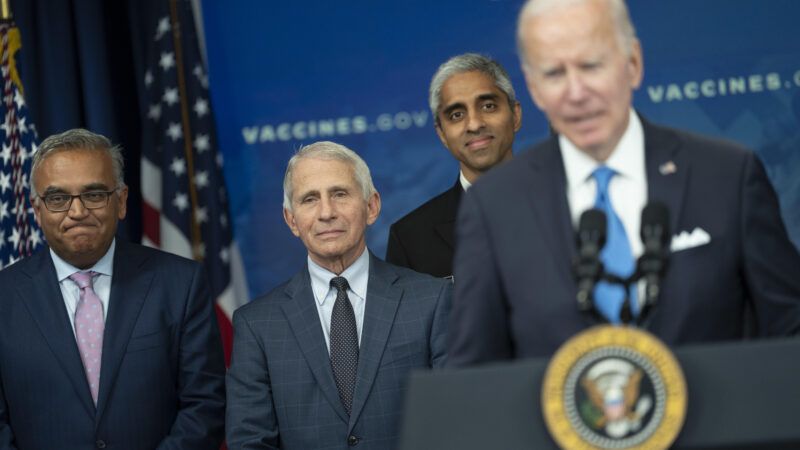The Surgeon General Exaggerates the Threat Social Media Poses to Kids
A new report calls for policy makers to take action when none is required.

U.S. Surgeon General Vivek Murthy has joined the veritable cacophony of calls for increased restrictions on youth social media usage. In an advisory report released on Tuesday, Murthy declared that social media presents a "meaningful risk" of harming kids and teenagers.
"We have gaps in our full understanding of the mental health impacts posed by social media but at this point cannot conclude it is sufficiently safe for children and adolescents," writes Murthy.
In that sentence, Murthy neatly summarizes the position of various lawmakers, psychologists, tech whistleblowers, and now the Biden administration as well: Given a lack of overwhelming evidence that social media is completely safe, great caution is warranted.
It is not surprising to see a top government health official default to knee-jerk wariness; the COVID-19 pandemic has shown that federal health bureaucrats are willing to substantially disrupt the lives of millions of people on an operating theory that some public health intervention is needed. Indeed, top White House pandemic advisers urged government officials at the state and local level to shutter schools, forcing millions of kids to endure virtual learning and social isolation. Even past the point at which most sectors of public life had resumed normal operations—and vaccines had become available—the Centers for Disease Control and Prevention (CDC) still fought to keep masks on schoolchildren's faces, thanks in part to dubious scientific findings.
The case for a massive government undertaking to mitigate the alleged ill effects of social media is similarly dubious. In his advisory report, as well as an accompanying op-ed in The Washington Post, Murthy echoes the concerns of various experts—most notably New York University professor Jonathan Haidt. The main problem is that some young people spend too much time on their phones, which in turn means they get too little sleep and exercise, while dealing with bullying and harassment.
If parents wish to heed these warnings, talk to their kids about excessive social media use, and encourage healthier behavioral patterns—like keeping their smartphones out of their rooms at night—that's all well and good. But Murthy is speaking on behalf of the U.S. government, and he should keep in mind that what occurs on social media is First Amendment-protected speech.
Young people are using Twitter, Facebook, Instagram, TikTok, Snapchat, Google, and YouTube to express themselves creatively, connect with their friends, gather information about the world (for homework purposes, or maybe just because they're curious), and cultivate new skills. Murthy's concern that some kids are having a bad time online is not sufficient to override the general principle that parents get to make these calls, not the federal government.
Discerning readers who look past the headline will note that Murthy's report does in fact acknowledge benefits to social media use.
"A majority of adolescents report that social media helps them feel more accepted (58%), like they have people who can support them through tough times (67%), like they have a place to show their creative side (71%), and more connected to what's going on in their friends' lives (80%)," he writes.
Even the more sinister findings are far from conclusive.
"When asked about the impact of social media on their body image: 46% of adolescents aged 13-17 said social media makes them feel worse, 40% said it makes them feel neither better nor worse, and only 14% said it makes them feel better," writes Murthy.
This is supposed to scare readers, even though a clear majority of kids are saying that social media is making them feel the same or better about themselves.
As the report is repeatedly forced to concede, the negative side of social media overwhelmingly centers around a narrow cohort—teenage girls—some of whom are made to feel worse about themselves due to social competition and being bombarded with unrealistic body images. The harmed group is a subset of a subset, and the problem is not widespread across all social media, but mostly confined to one specific website: Instagram.
It would be reasonable to advise parents to explore whether their own kids—particularly teenage girls with body image issues—are spending too much time online. If social media is negatively impacting their sense of self, interfering with their sleep schedules, or causing them to disengage from school or peer groups, then families should intervene—the same way they would intervene if a kid had developed an addiction or fallen in with a bad crowd.
But the fact remains that millions of kids are using their phones to stay more connected; this was especially true during the COVID-19 pandemic when federal authorities shut down their in-person gatherings.
Murthy's report ultimately calls for policy makers "to strengthen safety standards and limit access." Suddenly depriving millions of young people of access to social media would not make them healthier; on the contrary, it would probably make them miserable.


Show Comments (42)